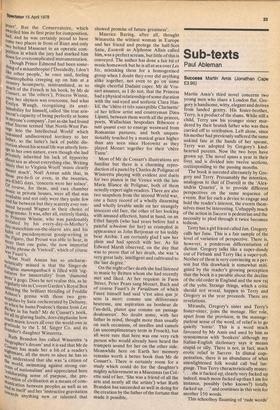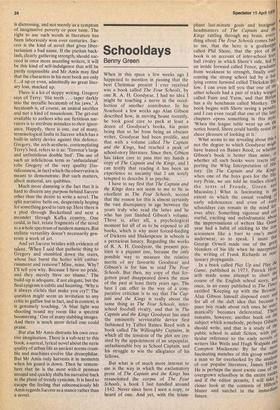Sub-texts
Paul Ableman
Success Martin Arnis (Jonathan Cape £3.95) Martin Amis's third novel concerns two young men who share a London flat. Gregory is handsome, witty, elegant and derives from landed gentry. His foster-brother, Terry, is a product of the slums. While still a child, Terry saw his younger sister murdered by their brutish father who was then carried off to retribution. Left alone, since his mother had previously suffered the same unkind fate at the hands of her spouse, Terry was adopted by Gregory's kindhearted parents. Now the two boys have grown up. The novel spans a year in their lives and is divided into twelve sections, corresponding to the passing months.
The book is narrated alternately by Gregory and Terry. Presumably the intention, analogous to that of Durrell in the 'Alexandria Quartet', is to provide different perspectives on the same sequence of events. But for such a device to engage and hold the reader's interest, the events themselves must be interesting. Unhappily much of the action in Success is pedestrian and the necessity to plod through it twice becomes tedious.
Terry has a girl friend called Jan. Gregory calls her June. This is a fair sample of the level of variation of perspective. There is, however, a ponderous differentiation of diction. Gregory talks like a super-dandy out of Firbank and Terry like a super-yob. Neither of them is very convincing as a person but this drawback is somewhat mitigated by the reader's growing perception that the book is a parable about the decline of the old order in England and the new raj of the yobs. Strange things, which a critic should not reveal, happen to Terry and Gregory as the year proceeds. There are revelations.
Miranda, Gregory's sister and Terry's foster-sister, joins the menage. Her role, apart from the provision, in the massage parlour sense of the word, of relief is to go quietly lonto'. This is a word much favoured by Mr Amis and used by him as synonomous with 'bonkers' although my Italian-English dictionary says it means stupid or silly. There is not, in fact, much erotic relief in Success. In dismal compensation, there is an abundance of what unenlightened folk would call bad lan guage. Thus Terry characteristically muses: . . she is fucked up, clearly very fucked up indeed, much more fucked up than I am for instance, possibly (who knows?) totally fucked up. . .' and continues in this vein for another 150 words.
This schoolboy flaunting of 'rude words'
is distressing, and not merely as a symptom of imaginative poverty or poor taste. The right to use such words in literature has been laboriously won over centuries. Suc
cess is the kind of novel that gives libertarianism a bad name. If the puritan back lash, clearly gathering strength, should suc ceed in once more muzzling writers, it will be this kind of self-indulgence that will be partly responsible and Mr Amis may find that the characters in his next book are only f....d up or even, admittedly no great literary loss, mucked up.
There is a lot of sloppy writing. Gregory says of Terry: 'His teeth . . taper darkly into the metallic hecatomb of his jaws.' A hecatomb is, of course, an animal sacrifice and not a kind of mausoleum. The get-out available to authors who use fictitious nar
rators is to attribute mistakes to their ignorance. Happily, there is one, out of many,
terminological faults in Success which has a built-in safety device against this defence. Gregory, the arch-aesthete, contemplating Terry's bed, refers to it as: 'Terence's large and unfastidious double bed'. The use of such an infelicitous term as `unfastidious' robs Gregory of the very quality (fastidiousness, in fact) which the observation is meant to demonstrate. But such matters, albeit material, are quibbles.
Much more damning is the fact that it is hard to discern any purpose behind Success other than the desire to write a novel. The split narrative belts on, desperately hoping for something good to turn up. Here there is a plod through Becketland and next a meander through Kafka country. One could, in fact, relate fragments of the novel to a whole spectrum of modern masters. But stylistic versatility doesn't necessarily generate a work of art.
And yet Success bristles with evidence of talent. `When I said that pathetic thing to Gregory and stumbled down the stairs, whose face burnt the hotter with embarrassment and remorse? Mine, mine. Why?
I'll tell you why. Because I have no pride, and they merely have no shame.' The build-up is adequate, if not elegant, but the final epigram is subtle and haunting. 'Why is it always clichés that make you cry?' The question might seem an invitation to any critic to guffaw but in fact, and in context, it is genuinely touching. 'A blue light was shooting round my room like a spectral boomerang.' One of many stabbing images. And there is much more detail one could praise.
But alas Mr Amis distrusts his own creative imagination. There is a sub-text to this book, a surreal, lyrical novel about the eerie quality of urban life as ancient norms crumble and machines evolve like drosophilae.
But Mr Amis only harvests it in moments when his guard is down. Then he remembers that he is the most with-it penman around and quickly shifts his narrative back to the plane of trendy cynicism. It is hard to escape the feeling that subconsciously Mr Amis regards Success as a stance rather than a novel.



































 Previous page
Previous page